Experts explore ‘power of place’ at Higher Education World Academic Summit co-hosted by University of Toronto
How are universities shaped by their surrounding regions, and how do they contribute to the economies and societies of their host cities? How has the COVID-19 pandemic transformed our use of physical and digital spaces? How do global networks complement local success?
These were some of the questions explored at the 2021 World Academic Summit hosted by Times Higher Education in partnership with the University of Toronto. Held Sept. 1-3, the virtual summit saw university presidents, researchers, lawmakers and industry leaders from across the world participate in an array of keynotes and panel discussions under the summit’s overarching theme: “How powerful is place?”
The conference – which drew roughly 700 participants, including nearly 100 university presidents, vice-chancellors and rectors – also explored several sub-themes, including the role of post-secondary institutions in advancing reconciliation with Indigenous communities and why the humanities and social sciences are needed to guide the development of new technologies.
President Meric Gertler said U of T was honoured to host the 2021 World Academic Summit, noting that the university and its partners at Times Higher Education had planned and prepared for the event for more than two years.
“There is no other event on the annual calendar that gathers together a broader or more impressive array of academic and industry leaders from around the world to discuss shared concerns and themes that span our sector,” President Gertler said.
“After more than two years in the making, our theme for the summit has only grown in importance and timeliness – ‘How powerful is place?’ The COVID-19 pandemic has challenged many of our long-held beliefs about the nature of place and the importance of physical proximity. It has also highlighted some difficult questions for higher education.”
The conference also featured release of the prestigious Times Higher Education World University Rankings 2022, which saw U of T ranked first in Canada and 18th in the world for the third straight year. Among North American public universities, U of T was the second highest-ranked school.
In remarks to kick off the summit, Toronto Mayor John Tory said the city and its institutions of higher education have long enjoyed a “strong and collaborative” relationship.
“A strong university – or better yet, a strong university system – helps build a strong urban region and vice-versa, and a strong country for that matter as well,” Tory said. “These excellent institutions, plus an inclusive and enviable quality of life, see our city ranked among the most liveable in the world.
“Make no mistake, the universities and the education system – its accessibility, its excellence – contribute to that.”
Tory added that the pandemic had produced powerful innovation and dialogue, and that he’s “delighted that Toronto and the University of Toronto are hosting the World Academic Summit to explore some very important questions and topics.”
Addressing inequality and geographic division
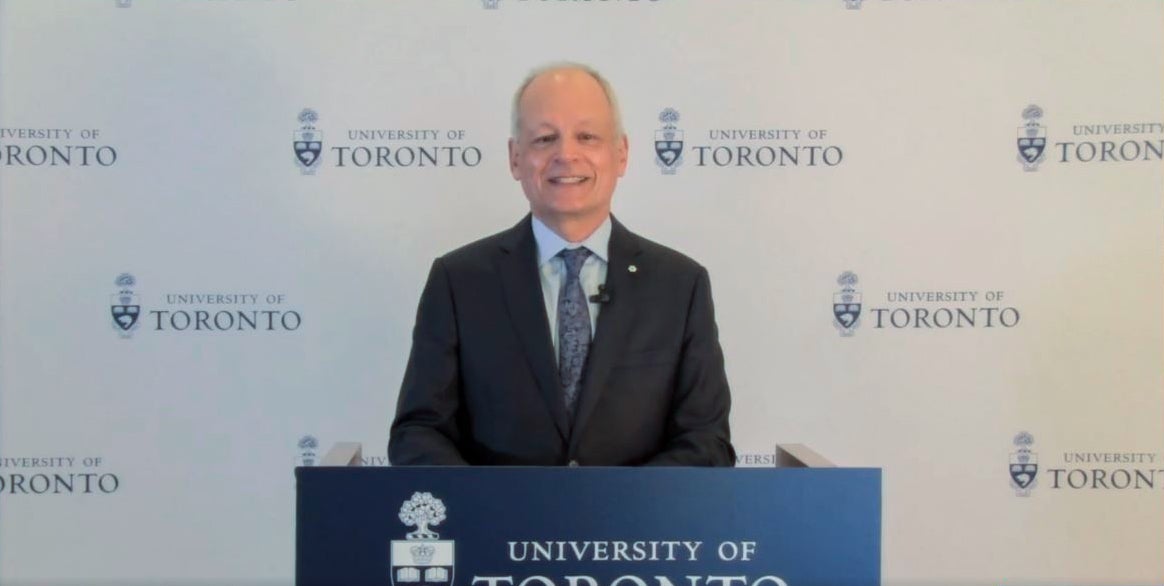
President Meric Gertler said improving access to education is key to tackling challenges such as poverty, exclusion and disenfranchisement, which have been magnified by COVID-19.
The summit’s first panel discussion saw President Gertler join counterparts from Johns Hopkins University, the University of Oxford and the University of Cape Town to discuss how world-leading universities can address inequalities and ensure they don’t contribute to the perpetuation of social divisions.
President Gertler said that improving access to education is crucial to tackle challenges such as poverty, exclusion and disenfranchisement, which he noted have only been magnified by the pandemic.
“Higher education is a vitally important driver of social mobility and prosperity. It’s one of the primary mechanisms by which those who come from economically and socially disadvantaged backgrounds become full participants in our society,” he said, calling education “the great leveller.”
A professor of urban geography whose research explores city-regions as sites of global innovation, President Gertler challenged the notion that universities’ global aspirations are in constant tension with their local responsibilities.
“I would argue that our international impact depends directly on the liveability and quality of life in our host cities, and also that our international impact can be advanced in really important ways by serving our local communities,” he said.
“The more that universities do to improve social inclusion and quality of life – broadly defined for their local community – the more they’re actually doing to enhance their own success in attracting and retaining the talent that drives that global impact, standing and acclaim.”
That includes working to boost access to education, which is crucial to tackling the rise of anti-science and anti-truth sentiments, President Gertler said.
“In those communities where participation in higher education … is lowest, that’s where we see the highest rates of vaccine hesitancy, anti-vaccine sentiment and suspicion about science.”
Innovation, equity and attracting the best in the world
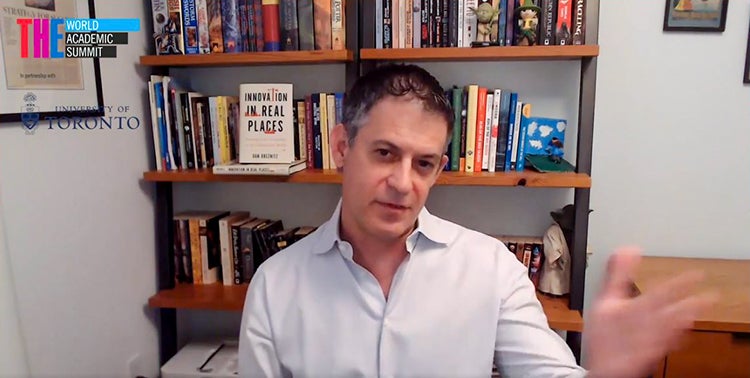
Dan Breznitz, chair of innovation studies at the Munk School of Global Affairs & Public Policy, said universities have a key role to play when it comes to fostering an innovative mindset among students.
Issues of equity were also addressed in the conference’s opening keynote, in the context of the innovation economy.
University Professor Dan Breznitz, chair of innovation studies at the Munk School of Global Affairs & Public Policy, discussed innovation policy and how it can be used to create a more equitable and sustainable economy.
He said the oft-admired Silicon Valley model of innovation – one driven by venture capital and tech startups – is difficult to replicate and creates high levels of income inequality. A better approach for most jurisdictions, he said, is to find and fill a niche stage of innovation that promises to bring wider economic benefits to the surrounding region.
Universities, meanwhile, should remain focused on teaching and research – but take note of what’s happening in their city and region, Breznitz said. That allows them to engage locally by reminding government policy-makers about the value of different innovation models.
Also key, according to Breznitz: Teach students to have an innovative mindset so they have the tools to create strong businesses and local jobs.
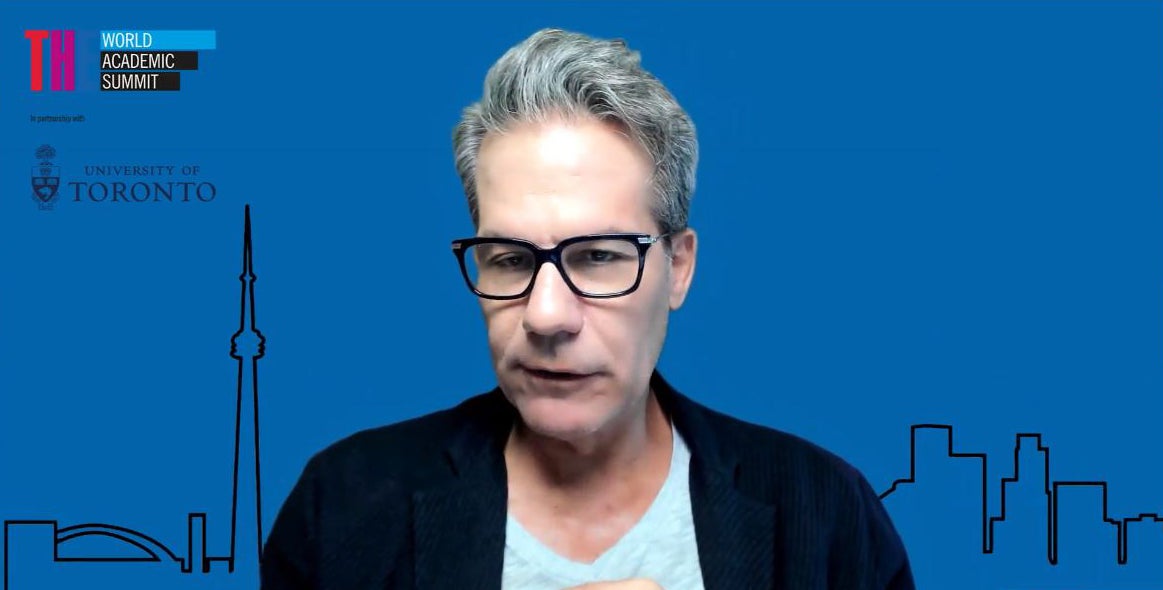
Richard Florida, University Professor at U of T’s Rotman School of Management, said “it’s hard to imagine your region being a centre for science, technology and innovation” without a great university.
The role of universities in creating dynamic regions was also discussed by a panel that looked at how post-secondary institutions can attract and retain talent.
Panel member Richard Florida, University Professor at U of T’s Rotman School of Management, said that leading, research-intensive universities are necessary to attract the brightest minds from around the globe.
“Universities are catalytic hubs of the knowledge economy,” said Florida, who has been studying the question for nearly four decades, making it a central theme of his influential book Rise of the Creative Class.
“Without a great university – or great universities – it’s hard to imagine your region being a centre for science, technology and innovation.”
Another benefit: Universities tend to create an environment of open-mindedness and tolerance, which is also a big draw for talent globally.
Florida, who was joined by panelist Stephen Cairns, co-director of the Future Cities Laboratory at the Swiss Federal Institute of Technology in Zurich, noted the concentration of great universities, innovation and start-ups is incredibly uneven.
For example, he said six metropolitan areas around the world account for 50 per cent of all venture capital startups. Therefore, any discussion of addressing economic inequality or class-based inequality needs to consider such geographic inequalities, he said.
Universities in the community
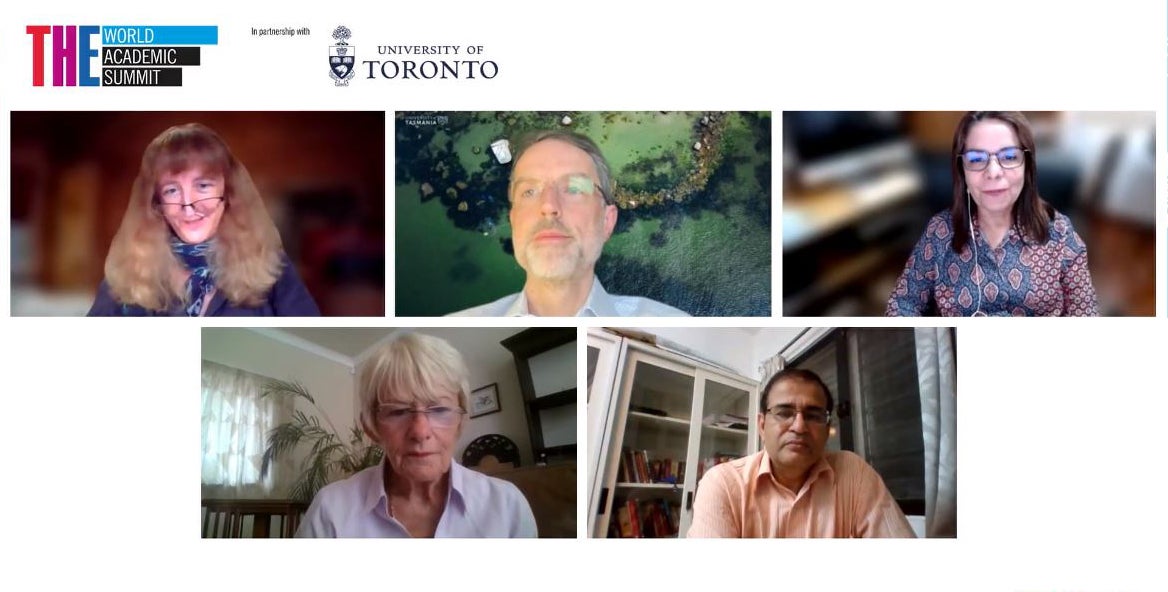
Clockwise from top left: Karen Chapple, Rufus Black, Denise Pires de Carvalho, Subhasis Chaudhari and Dame Nancy Rothwell participate in a panel discussion that brought together university leaders from the Global North and South.
The summit’s third panel, moderated by Karen Chapple, director of U of T’s School of Cities, presented education leaders from the Global North and South the question: What kind of universities do we need?
The panel included Dame Nancy Rothwell, president and vice-chancellor of the University of Manchester; Subhasis Chaudhari, director of the Indian Institute of Technology (IIT) Bombay; Denise Pires de Carvalho, rector, Federal University of Rio de Janeiro; and Rufus Black, president and vice-chancellor, University of Tasmania in Australia.
Reflecting on lessons learned since the start of the pandemic, the four experts discussed change management, learning about students – particularly those who are digitally excluded – and, most recently, working with communities on vaccination efforts.
“There’s this recognition that we’re all in this together,” Chapple said during the event. “We’re all excited to see how we leverage that new creative action to lift up people not just in the university but the communities that around us.”
The sentiment was echoed by Pires de Carvalho: “The society nowadays knows the importance of our institutions for the country – [and] not only because we are well known by our ability to [develop] doctors, engineers or lawyers.”
Rothwell, similarly, said she hopes to see universities and their communities come together around important issues such as climate change – just as they did in combatting COVID-19.
“If we can deploy the same spirt of collaboration and bringing together experts from different fields that we did over vaccination – if we can deploy that sort of approach to net zero and climate change – I think we’ve got a real chance of tackling what is an even bigger issue than COVID,” Rothwell said.
The legacy of place
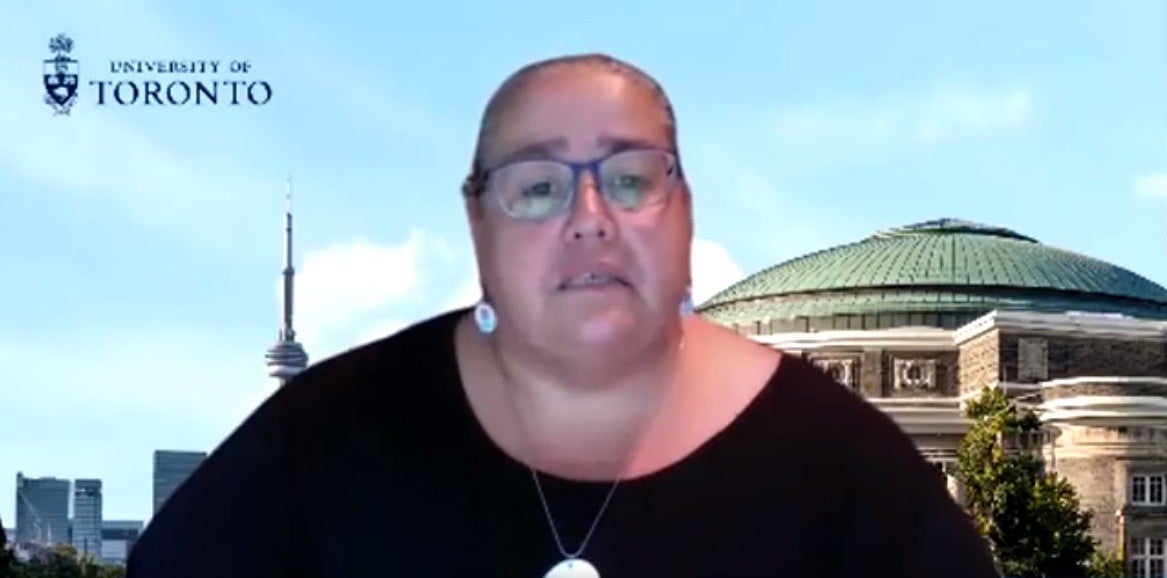
Associate Professor Susan Hill, director of U of T’s Centre for Indigenous Studies, said reconciliation with Indigenous Peoples is a process, not a destination, and that universities have a key role to play.
Yet, even as universities seek to forge a better future, critical questions remain about how they can help society make amends for the past – particularly the legacy of colonialism, slavery and mistreatment of Indigenous Peoples.
These and other questions were addressed in a pair of panel discussions.
The first, titled “What universities owe the descendants of slavery,” explored the ways in which Western universities benefited from slavery and helped to legitimize the practice, according to an article in Times Higher Education.
“It was the university sector more than any other that strengthened the ideological and public base of slavery,” Sir Hilary Beckles, vice-chancellor of the University of the West Indies, was quoted by Times Higher Education as saying during the discussion.
While universities have taken steps to acknowledge their ties to slavery, Beckles – who was jointed on the panel by Anton Muscatelli, principal and vice-chancellor of the University of Glasgow and Daina Ramey Berry, professor and chair of the history department at the University of Texas at Austin – said they also need to be ethical leaders on the matter and listen to outside voices “on their true level of accountability.”
A second discussion – a keynote titled “The legacy of place: How to take transformative action” –focused on Indigenous Peoples and featured Associate Professor Susan Hill, director of U of T’s Centre for Indigenous Studies, and Professor Shaun Ewen, pro vice-chancellor (Indigenous), at the University of Melbourne in Australia.
Hill said it’s crucial to view reconciliation as a process rather than an end.
“I think reconciliation has been framed in the Canadian context as a starting place for conversation,” she said. “Far too often, people assume that it’s a destination. But, in reality, I think we’re always going to be in some aspect of movement within that – and I think that’s fine. It’s about relationship.”
Asked how universities should respond to the discovery of unmarked graves on the grounds of former residential schools in Canada, Hill said universities have a responsibility to help ensure such atrocities never take place again by making sure all community members are educated about the past.
“This isn’t actually news to people who have been listening … it’s unfortunate that it took this information about unmarked graves to get people’s attention, but I’m glad that so many people are now listening,” she said. “It’s really on the shoulders of universities to make sure their students, faculty and staff are not unaware – so, thinking about how we have a campaign of information mobilization that also helps to empower people … and also equipping people with the tools so that they can do something about it.”
Ewen, meanwhile, noted similarities between best practices to advance reconciliation in Canada and Australia, as evidenced by the findings of the Truth and Reconciliation Commission of Canada and Australia’s 1997 Report of the National Inquiry into the Separation of Aboriginal and Torres Strait Islander Children from Their Families (also known as the “Bringing Them Home” report). But he also warned each countries’ unique context will determine how reconciliation unfolds.
“I don’t think Australia is the same as Canada, and I don’t think the University of Melbourne is the same as the University of Toronto,” he said. “We have our similarities, of course, but our understanding of our histories and our responses will be locally informed and nuanced in a place-based way.”
While both panelists agreed that universities have a long way to go to advance reconciliation, they identified areas where universities have made progress.
“What I’m really excited to see is that more institutions are starting to listen to the Indigenous communities that they’re trying to partner with,” Hill said. “They’re taking more of a sitting-back approach and giving space for Indigenous communities to lead relationships and partners.
“In many cases, the communities know what needs to be done, they just don’t always have the resources to make it happen. That’s where universities have something to offer.”
Why technology needs the humanities (and universities)
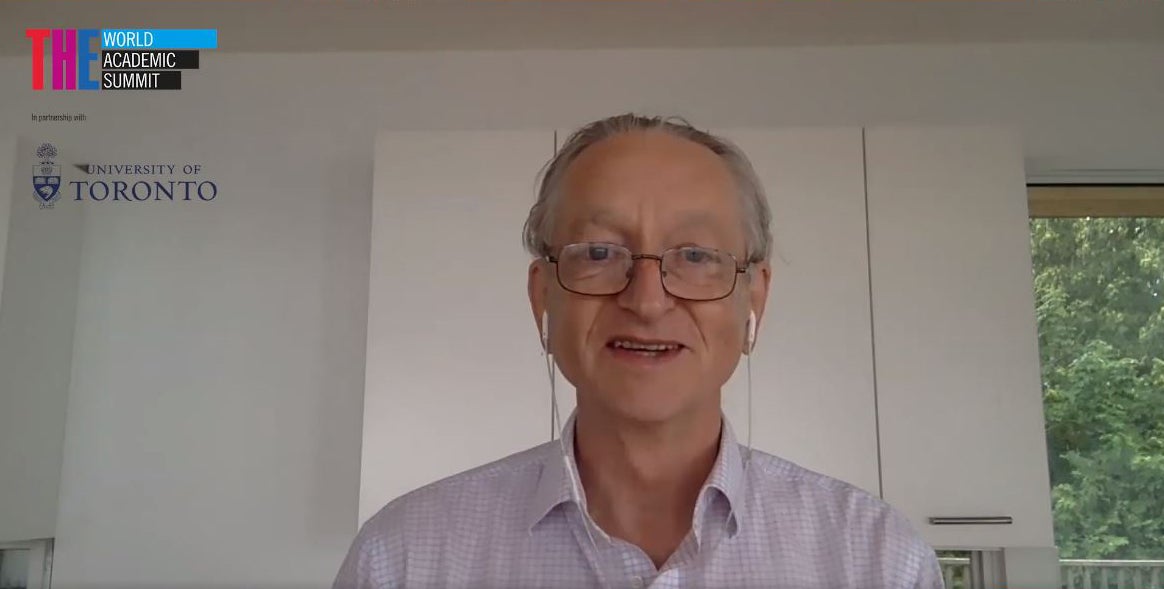
Deep learning pioneer Geoffrey Hinton said the humanities and social sciences are needed to guide technological developments – which is why universities are essential to the development of artificial intelligence.
The summit’s first day ended with a one-on-one interview with U of T Distinguished Professor Emeritus Geoffrey Hinton, an AI luminary and pioneer of deep learning.
Hinton, who works at Google, revisited a career trajectory that took him from the United Kingdom to the United States – and, ultimately, Canada and Toronto. He discussed how each of those places influenced the field of AI, noting Toronto is now a leader in the field of deep learning – a technology that many believe is poised to revolutionize everything from medicine to transportation. He also hailed the creation of the Vector Institute for Artificial Intelligence, a partnership between U of T, government and industry where he is chief scientific adviser.
Hinton also highlighted the importance of the social sciences and humanities in ensuring that technologies such as AI are harnessed in ethical and socially conscious ways – a focus of the recently created Schwartz Reisman Institute for Technology and Society, which will be located at U of T’s new Schwartz Reisman Innovation Campus.
“Technology allows us to create lots of goodies, but how those goodies get distributed and used depends on things that aren’t technology – it depends on social decisions about how we should divide things up, and those are really important,” Hinton said.
Universities, he added, “are going to be essential for ethical research on AI.”
Remote learning and teaching
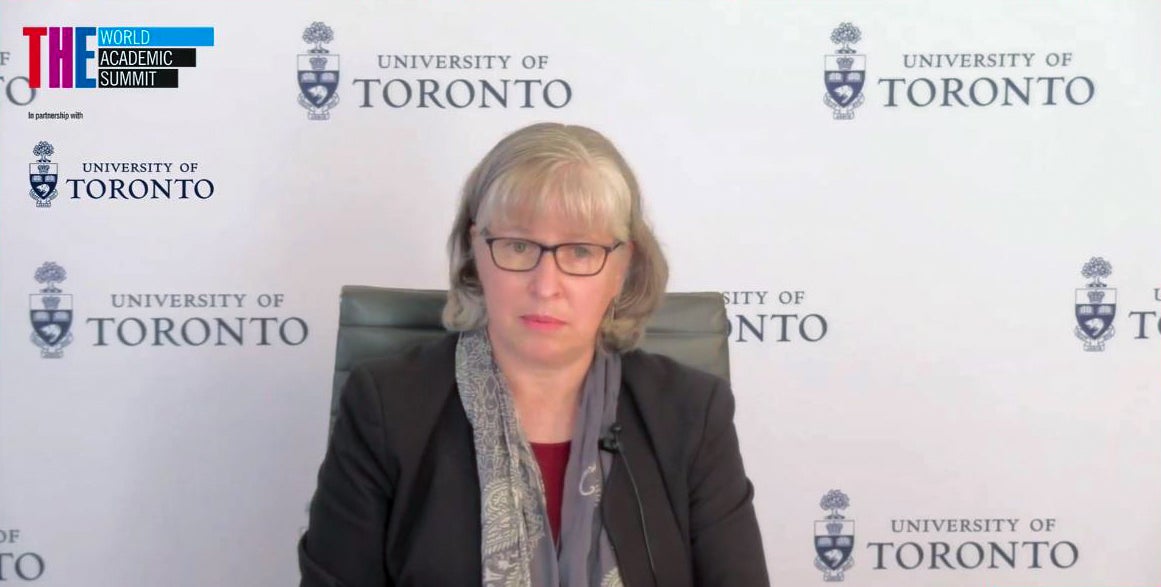
Universities must be “technologically excellent,” but make sure to use that technology in a way that supports an in-person experience for students, said Professor Susan McCahan, U of T’s vice-provost, innovations in undergraduate education.
The pandemic has underscored, many times over, the importance of technology in the education sector – and several of Thursday’s sessions explored how COVID-19 restrictions have affected teaching, learning, research and collaboration.
One of the panels saw the Times Higher Education consultancy team present insights from the THE Student Pulse, which surveyed more than 2,000 students around the world about their views on online and in-person learning experiences. The results were consistent with what U of T learned from its students since March 2020, according to Professor Susan McCahan, U of T’s vice-provost, innovations in undergraduate education.
“As we went through the pandemic, we observed that students were very hungry for in-person experiences and particularly for opportunities to connect with peers,” said McCahan, who was joined by Christine Ofulue, associate professor of linguistics at the National Open University of Nigeria, Jose Escamilla, director of educational innovation at Tecnológico de Monterrey, and Betty Vandenbosch, chief content officer at Coursera.
“Building that social interaction into online classes became critical.”
McCahan added the findings support the idea that students are looking for a university that is not only technologically excellent, but uses educational technology in a way that supports in-person learning effectively.
“They’re looking for that high-tech part of education technology – but only as a piece of supporting the in-person experience, particularly the connection between students and other people, their peers, their mentors, professors, our staff and the place that they are located in,” McCahan said.
Collaboration and Communication during COVID-19
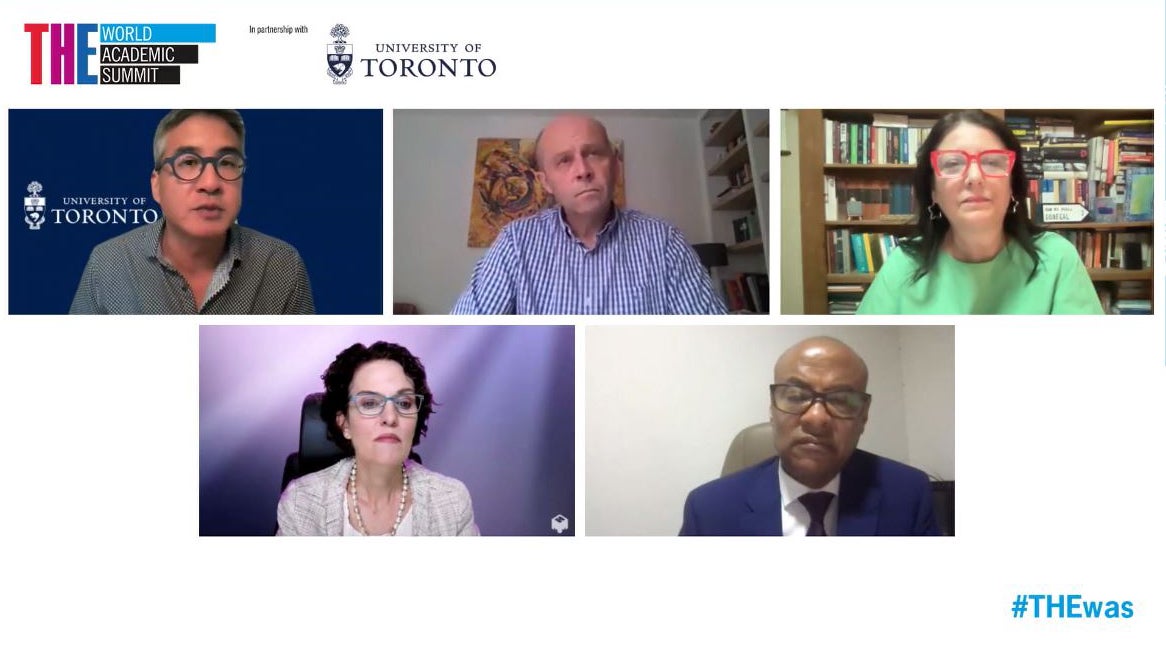
Clockwise from top left: Joseph Wong, Philip Cotton, Gül İnanç, Tassew Woldehanna and Annalise Riles participate in a panel on global collaboration.
Yet another panel saw Joseph Wong, U of T’s vice-president, international, moderate a discussion about global academic, educational and research collaboration during the pandemic.
He emphasized that COVID-19 occurred at a time when deep structural inequalities of society are being brought to the surface in very public ways. This means universities must do more to create opportunities for greater inclusion when it comes to collaboration, he said.
Annelise Riles, associate provost for global affairs at Northwestern University, expressed optimism about how the current climate might allow voices that were traditionally marginalized to finally be heard.
“The world is on the verge of a global reset and the traditional paradigms that we take for granted no longer hold,” Riles said. “The opportunity here is to create a new conversation globally.”
Tassew Woldehanna, president of Addis Ababa University, said it’s been challenging for African universities to maintain collaborations with universities in the West. He said the number of student exchanges, which African universities value particularly highly, have dropped significantly. Yet, despite the challenges, Woldehanna said his university was able to forge new connections with fellow African universities, as well as some universities globally, to work on COVID-related projects such as developing sanitizers, medicines and ventilators.
U of T created a program in 2003 that now sends dozens of its teaching staff every year to provide medical and academic training at Addis Ababa University – an initiative that has helped produce more than 250 medical professionals in Ethiopia, who, in turn, have helped staff local universities, according to a recent article in Times Higher Education magazine.
Wong emphasized the important contributions Western institutions can make overseas during the panel discussion. “That means building partnerships with diverse institutions, with institutions that don’t look like ours, that bring to the table different kinds of resources,” Times Higher Education quoted him as saying.
The pandemic has also had a significant impact on the ways in which universities communicate with their students, faculty, staff and external audiences such as government and the news media.
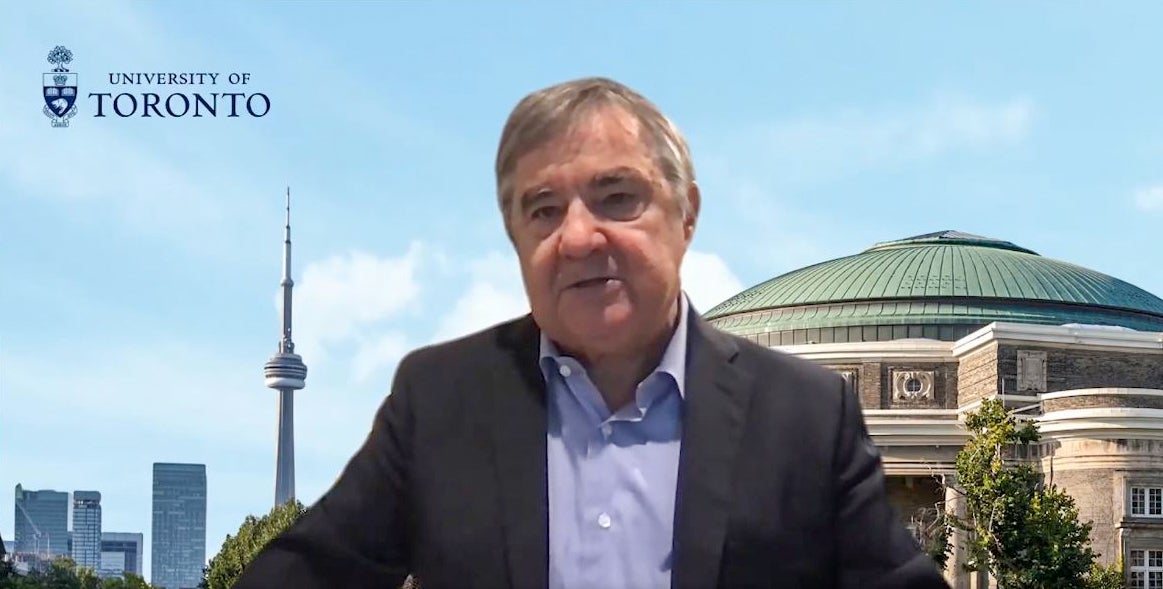
The pandemic revealed gaps in university communications, but also led to important innovations, said David Estok, U of T’s vice-president, communications.
David Estok, U of T’s vice-president, communications, outlined some of the ways in which the pandemic affected U of T’s approach to communication in a panel discussion with Johanna Lowe, director of marketing and communications at the University of Sydney, and Jane Chafer, director of marketing, recruitment, communications and global at the University of Exeter.
Estok reflected on how U of T communicators responded to an unprecedented scenario in which 6,000 courses were moved online over the course of a weekend as the university and wider society scrambled to adapt to the onset of the pandemic.
“Hundreds of decisions needed to be made in the ever-changing context of public health regulations, and needed to be communicated simply, accurately and quickly,” Estok said.
He added that U of T communicators did a remarkable job, under challenging circumstances, to respond to what he dubbed the “COVID curveball.”
“Just when you think you’re going down a certain path and you’ve done all this work, planning and communications, there’s a new announcement or new development,” he said. “One of the lessons is the importance of flexibility – the ability to say, ‘Here’s another day, here’s another challenge,’ and respond as quickly as you can.”
In the case of U of T, Estok said its COVID-19 communications underscored three broad themes: how U of T scientists and scholars were contributing to pandemic research; how U of T was mobilizing university resources to help the community and the country fight COVID-19; and the resilience and caring shown by the university community amid the crisis.
He said COVID-19 also revealed gaps in university communications, especially in the area of internal communications because most resources are externally focused. He added that the pandemic also accelerated innovation in U of T’s university communications, including the creation of highly successful podcasts and increased use of videos to highlight the knowledge of university researchers and experts.
‘The epitome of power of place’
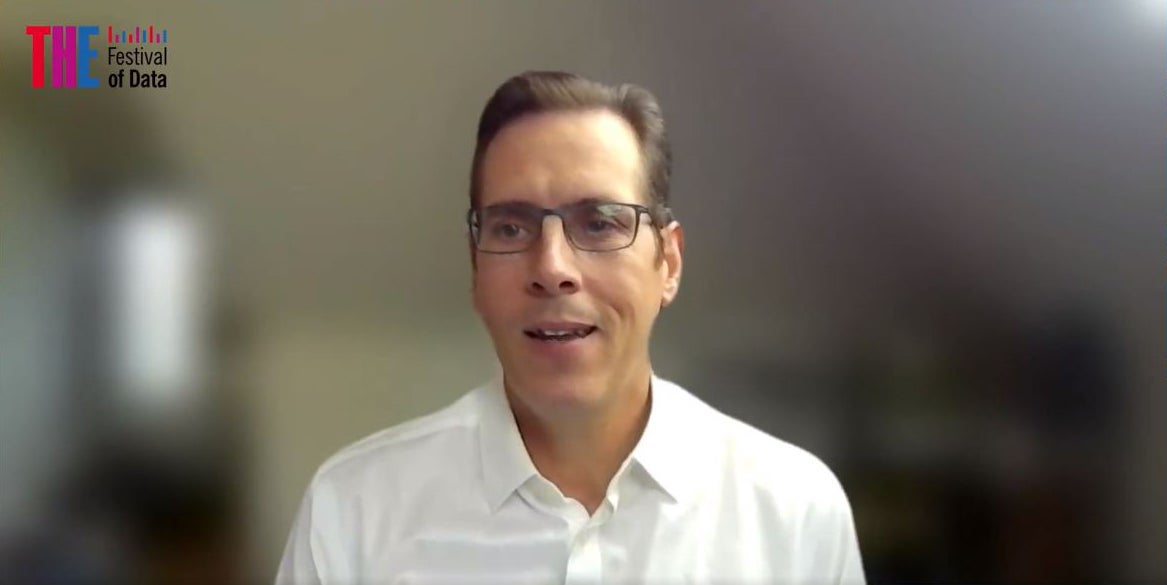
Simon Pratt, director of research strategy and excellence at U of T, answered questions about the progress of universities’ impact in relation to the UN Sustainable Development Goals.
The third and final day of the summit featured a Festival of Data, which comprised an array of discussions that explored opportunities to use data and analytics in higher education. Among the programs was a session that saw members of the Times Higher Education Impact Rankings Advisory Board – including Simon Pratt, director of research strategy and excellence at U of T – field questions from attendees about the progress of universities’ impact in relation to the UN Sustainable Development Goals.
In his closing remarks to end the summit, Phil Baty, chief knowledge officer at Times Higher Education, cited data from conference partner Elsevier that showed the extent to which U of T drives research, innovation and reputation for the city of Toronto, calling it “the epitome of power of place.”
Baty also referenced a remark from School of Cities Director Chapple’s panel – “We deal in transformation, and we deal in kindness” – and said it exemplified what contemporary universities should strive to be.
“So much of the conversations have been around how we need to re-engage with disenfranchised communities, how we need to connect with people who have been victims of widening inequality [and] how we need to look at really powerful reconciliation with Indigenous people,” Baty said.
“Universities are kind in so many ways – in terms of making the world a better place, in terms of transforming people’s life chances, and in terms of empowering their communities and cities. And I think that’s a really exciting and special raison d’être for universities worldwide.”
President Gertler closed out the conference by hailing “a truly wonderful couple of days of insight and conversation” that covered themes from innovation, creativity and collaboration to reconciliation and sustainability.
He said the diversity of perspectives represented in the various panels was a key element in the summit’s success.
“Only by creating the biggest tent, learning from the broadest range of perspectives, can we hope to meet the challenges facing us all.”

